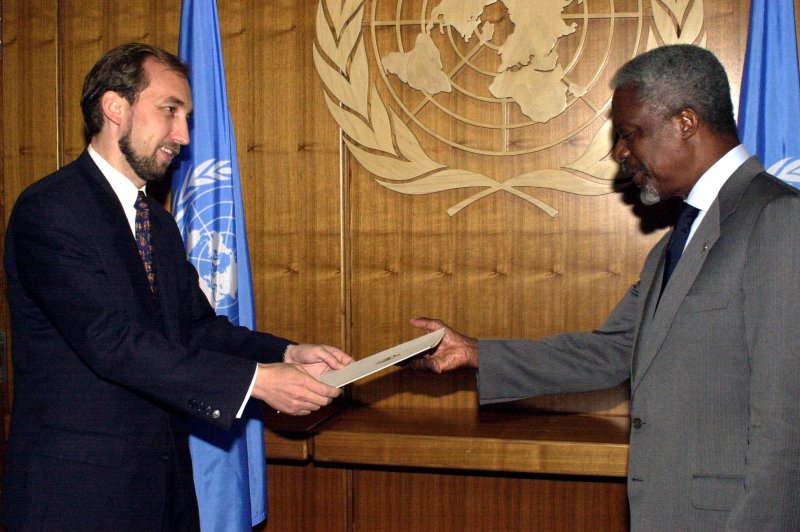1 of 2 | Prince Zeid Ra'ad Zeid Al Hussein, pictured when he was the Permanent Representative of Jordan to the United Nations, presenting his credentials to then Secretary-General Kofi Annan. (mc/ep/Ezio Petersen/UPI) |
License Photo
GENEVA, Switzerland, Sept. 8 (UPI) -- The United Nations' new High Commissioner for Human Rights, Zeid Ra'ad Zeid al-Hussein, spoke out Monday against Islamic extremism and urged the international community to end the conflicts in Iraq and Syria.
Speaking for the first time to the U.N. Human Rights Council in Geneva, Zeid noted that the displacement of half the Syrian population and the escalating violence in Iraq makes it "clear the immediate and urgent priority of the international community should be to half the increasingly conjoined conflicts in Iraq and Syria," particularly, he said "to protect religious and ethnic groups, children -- who are at risk of forcible recruitment and sexual violence -- and women, who have been the targets of severe restrictions."
In Syria, UNHCR recently reported more than three million Syrians have fled the three-year old conflict and another 190,000 have been killed. The U.N. Human Rights Council last week observed that ethnic and religious violence in Iraq is at "unprecedented" levels.
Zeid called for accountability for those who have committed human rights violations, and urged Iraq to consider becoming party to the International Criminal Court.
"Accountability, and public acknowledgment of the wrongs that victims have suffered, is important to ensuring that crimes will not be repeated, and the only way to begin to repair a sense of common community in these devastated societies."
The international community, Zeid said, must also "take a step back and look at how and why these crises erupted." Such an examination of the conflicts, he observed, might help uncover "patterns of violations and discrimination, including corrupt and discriminatory political systems that disenfranchised large parts of the population, created an inflammable backdrop."
In order to ensure the protection of human rights, Zeid voiced support for the adoption of a code of conduct by permanent members of the U.N. Security Council that would impose a moratorium on vetoes "in situations where atrocities are ongoing and where those facts are well founded." That proposal, led by France, is scheduled for discussion at the U.N. on September 25.
Zeid, a Jordanian prince and former ambassador to the U.N., is the first Arab and the first Muslim to serve in the position of High Commissioner for Human Rights. On Monday, he said he was "humbled" to succeed Navi Pillay, whom he described as "one of the greatest senior officials the United Nations has ever had."















